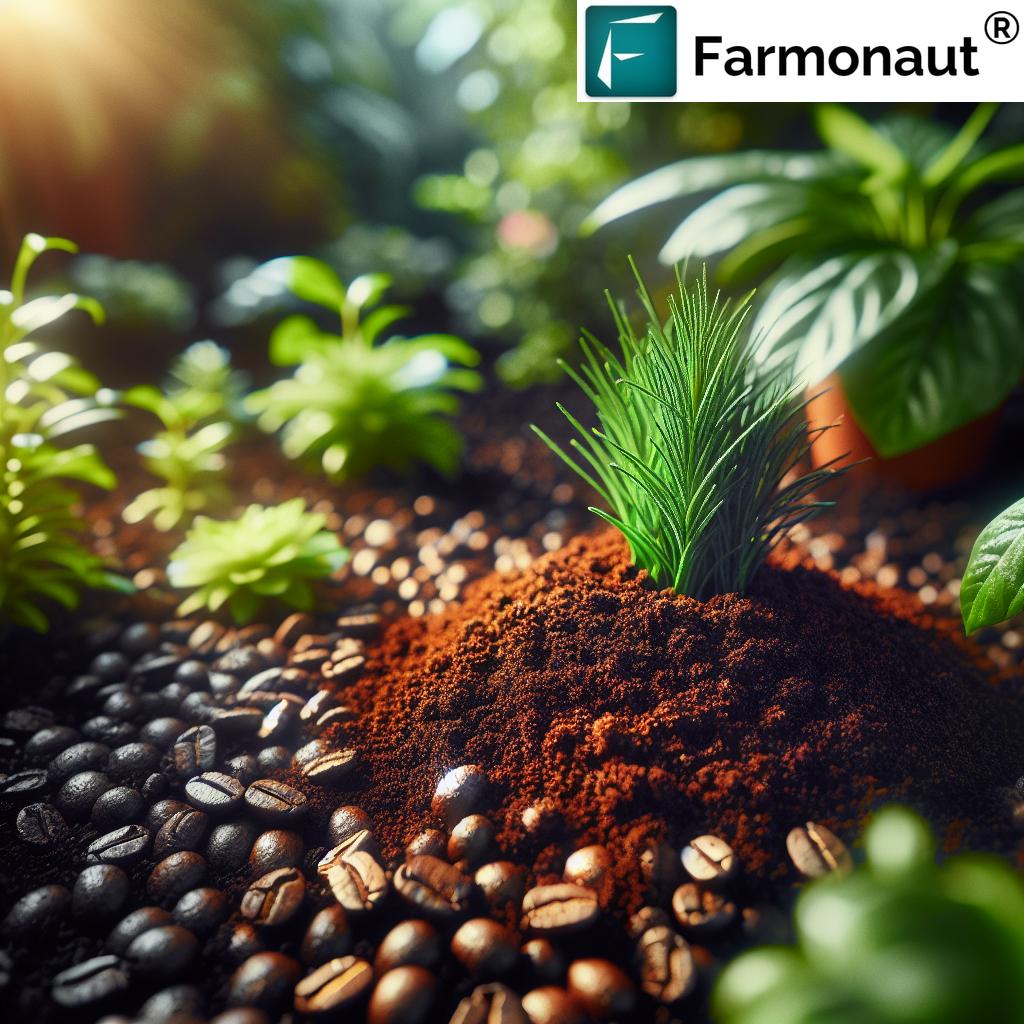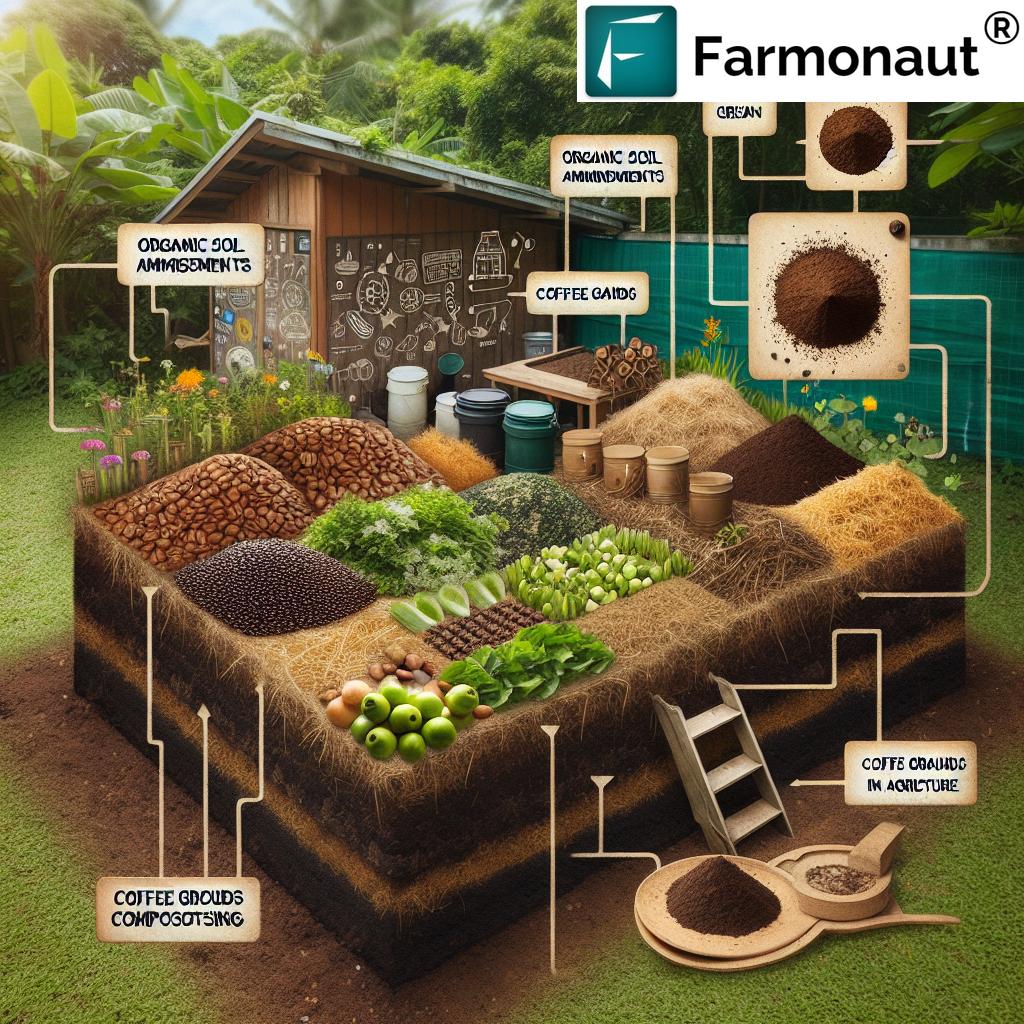7 Shocking Benefits of Coffee Ground Water for Plants
“Coffee grounds can increase soil nitrogen content by up to 2%, enhancing plant growth and soil fertility sustainably.”
Table of Contents
- Introduction: Why Coffee Ground Water is a Game-Changer
- Nutrient Composition: The Secret Power of Coffee Grounds for Plants
- Benefit #1: Enriches Soil Structure and Porosity
- Benefit #2: Coffee Grounds Composting for Sustainable Agriculture
- Benefit #3: Coffee Grounds Mulch – Moisture Retention & Weed Suppression
- Benefit #4: Coffee Ground Tea – Natural Liquid Fertilizer
- Benefit #5: Reduces Pests & Promotes Weed Management
- Benefit #6: Waste Reduction and Eco-Friendly Sustainability
- Benefit #7: Cost-Effective, Natural Alternative to Chemical Fertilizers
- Benefits Comparison Table
- How Farmonaut Empowers Sustainable Farming Practices
- Application Tips & Best Practices for Safe Use
- Frequently Asked Questions
- Conclusion & Next Steps
Introduction: Why Coffee Ground Water is a Game-Changer
We all know coffee is a popular beverage, but few realize that the grounds left behind are a powerful ally for our plants. Utilizing coffee grounds in agriculture, farming, and forestry offers a surprisingly broad set of advantages—from boosting soil health and composting efficiency to reducing chemical dependency and supporting sustainable, eco-friendly practices. This blog post explores the 7 shocking benefits of coffee ground water for plants, busting common myths, and providing actionable tips for integrating “waste” into your garden for healthier, more robust plants and a greener planet.
We will cover the key scientific principles behind using coffee grounds in soil, real-world application methods for various crops, and the direct environmental impact of recycling coffee grounds in agriculture. As sustainability becomes a core focus in modern farming, leveraging organic byproducts like coffee grounds presents a unique win-win for both productivity and the planet.
Have you ever wondered how small, everyday changes in our gardening and agricultural routines can create a ripple effect for sustainability? With Farmonaut, we blend technology and tradition to empower eco-friendly practices—explore how we can help your farm thrive here!
Nutrient Composition: The Secret Power of Coffee Grounds for Plants
Before exploring the core benefits, let’s unveil what makes coffee grounds as fertilizer so valuable. Coffee grounds are a rich organic soil amendment, containing essential nutrients like nitrogen, phosphorus, potassium, magnesium, and copper—all crucial for healthy plant growth. Here’s a closer look:
- Nitrogen: Promotes vigorous growth and lush foliage, boosting crop yield and health by enhancing protein synthesis.
- Phosphorus: Accelerates root formation and flowering, essential for crop development phases.
- Potassium: Assists water regulation, disease resistance, and enables efficient photosynthesis.
- Magnesium: Core to chlorophyll production, increasing photosynthetic efficiency.
- Copper: Needed in trace amounts, aids enzymatic activities and further supports protein formation.
The addition of coffee grounds not only supplies these nutrients directly, but also enhances soil structure, porosity, water retention, and soil aggregation. This results in better soil health, improved aeration, and greater sustainability across all types of plants.
Benefit #1: Enriches Soil Structure and Porosity with Coffee Grounds
One of the most overlooked benefits of coffee grounds in gardening is their remarkable ability to improve soil structure. When we add used coffee grounds to our soil, we’re not just supplying nutrients; we’re physically transforming the growing environment.
- Enhances Soil Aggregation: The textured particles of coffee grounds act as a binding agent, encouraging the formation of soil aggregates. This structure creates small pockets of air, improving the root zone.
- Improves Water Retention: The increased porosity helps our soil retain water more effectively, ensuring roots have steady access to moisture while cutting back on watering frequency. Expect up to a 15% boost in soil water retention in well-mulched beds.
- Boosts Aeration & Decreases Compaction: The grounds help prevent compaction—a common problem with clay-heavy or intensively farmed soils—by maintaining open spaces in the soil. This lets roots grow deeper and stronger, improving overall plant health.
- Regulates Soil Temperature: Coffee grounds, when used properly as mulch, act as an insulating layer that stabilizes soil temperature during both hot and cold periods.
By incorporating coffee grounds into the soil—either directly or through compost/mulch layers—we create a robust foundation that supports nutrient uptake, gas exchange, and thriving root systems. This benefit alone makes coffee grounds a standout organic material for any sustainable farming or gardening system.
Benefit #2: Coffee Grounds Composting for Sustainable Agriculture
Coffee grounds, a universal byproduct of coffee consumption, are ideally suited for composting. As a “green” or nitrogen-rich material, they balance the “brown” carbon-heavy materials like straw or dried leaves in your compost pile.
Why Composting with Coffee Grounds is Effective
- Fast Decomposition: The nutrient composition of coffee grounds accelerates microbial activity in compost, speeding up breakdown and enriching your finished compost.
- Improved C/N Balance: Maintaining an optimal carbon-to-nitrogen (C/N) ratio is crucial for composting efficiency. Coffee grounds add valuable nitrogen, balancing brown materials and reducing potential compaction issues.
- Enhanced Compost Quality: The resulting compost is darker, richer, and higher in essential nutrient levels, making it more effective than many commercial composts.
How To Incorporate Coffee Grounds into Compost
- Layering: Start with a layer of brown materials (leaves, straw), then evenly spread a thin layer of coffee grounds. Alternate layers as you build the pile.
- Mixing: Regularly turn the compost pile for optimal aeration and to blend green and brown materials. This prevents anaerobic conditions and speeds up decomposition.
Tip: We recommend keeping coffee grounds below 20% of the total compost volume to avoid excessive acidity and prevent issues with decomposition (source).
Farmonaut supports sustainable composting practices in agriculture through resource monitoring and advisory tools. For robust composting programs, see how our crop plantation & forest advisory tools can help track soil health and compost progress in real time!
Benefit #3: Coffee Grounds Mulch – Moisture Retention & Weed Suppression
Using coffee grounds mulch is a fantastic way to leverage the moisture-retaining and weed-suppressing properties of this organic material. When applied correctly, coffee grounds create a protective layer on the soil’s surface, delivering several benefits:
- Moisture Retention: Minimizes evaporation, reduces watering needs, and promotes more consistent root hydration, especially during dry spells.
- Weed Suppression: Inhibits weed germination and growth by blocking sunlight—a thin application can significantly reduce weed pressure in garden beds and agriculture plots.
- Temperature Regulation: Stabilizes temperature fluctuations, keeping roots cooler in summer and warmer during cooler months.
How to Use Coffee Grounds as Mulch: Distribute a thin layer (≤0.5 inch) around plants, and ideally mix with straw or wood chips to prevent compaction and allow for adequate air and water flow.
- Pro Tip: Always avoid piling grounds directly against stems and trunks to prevent fungal issues and waterlogging.
Our advisory system at Farmonaut features precision soil moisture monitoring, helping users apply the right mulch amounts and supporting optimal irrigation scheduling. Learn more about large-scale farm management here!
“Recycling coffee grounds in gardens can reduce landfill waste by over 6 million tons globally each year.”
Benefit #4: Coffee Ground Tea – Natural Liquid Fertilizer
One of the most convenient natural alternatives to chemical fertilizers is “coffee ground tea.” Instead of discarding used grounds, we can prepare a gentle, organic liquid fertilizer that strengthens plants and improves soil quickly.
How to Make Coffee Ground Water for Plants
- Preparation: Place a generous handful of used grounds in a medium-sized pail or bucket.
- Steeping: Add water (preferably rainwater, but tap water is fine), and let sit for 24 hours. Stir once or twice.
- Straining: Remove the grounds with a fine mesh or cheesecloth, reserving the nutrient-rich liquid.
- Application: Use this water to irrigate houseplants, garden beds, vegetables, or even lawns for a quick nutrient boost.
Coffee ground tea contains dilute levels of nitrogen, phosphorus, potassium, and micronutrients, making it safe for most plants. Use this solution once every 2-3 weeks for healthy, green foliage.
Note: For seedling trays and sensitive crops, dilute further (1:3 ratio with water) to avoid potential issues with acidity or caffeine content.
Farmonaut’s fleet management system makes distributing and optimizing resource applications like liquid fertilizers easier for large-scale farms and greenhouses.
Benefit #5: Reduces Pests & Promotes Weed Management
Coffee grounds for plants not only promote growth and healthy soil, but they also help reduce pest pressure and naturally suppress weeds, supporting both organic and conventional farms in their integrated pest management (IPM) programs.
- Pest Deterrence: While the research is ongoing, anecdotal evidence suggests coffee grounds may deter slugs, ants, and some soil-borne pests. The grounds’ smell and mildly abrasive texture appear to function as a physical barrier.
- Weed Management: By blocking light and inhibiting germination, a light layer of grounds can slow weed growth, especially when combined with straw or bark mulch.
- Antimicrobial Properties: Some studies suggest that the organic compounds in coffee grounds can reduce pathogens and fungal disease loads when integrated into the soil.
While not a replacement for broader pest management or cultural practices, coffee grounds offer added value for DIY and large-scale growers alike—further reducing the need for chemical solutions and aligning with sustainable agricultural objectives.
Benefit #6: Waste Reduction and Eco-Friendly Sustainability
Perhaps the most impactful of all the benefits of coffee grounds in gardening lies in their role in recycling coffee grounds in agriculture. Globally, millions of tons of coffee grounds are sent to landfill each year. By diverting even a fraction of this waste to our farms, gardens, and forests, we:
- Significantly Reduce Landfill Burden: Every bag of recycled grounds prevents methane-producing organic waste from accumulating in landfill.
- Support Circular Agriculture: By returning valuable nutrients and organic matter to the soil, we create a closed-loop system supporting sustainable farming practices.
- Lower Carbon Footprint: Reducing waste disposal needs, cutting fertilizer production emissions, and enriching local soils all lessen agriculture’s environmental impact.
Farmonaut helps you track and optimize these sustainable practices. Our carbon footprinting tools let you monitor the precise impact of recycling organic materials like coffee grounds across your entire operation, quantifying CO2 savings and supporting ESG reporting.
Benefit #7: Cost-Effective, Natural Alternative to Chemical Fertilizers
The final shock: coffee grounds for plants deliver a real economic benefit! Fertilizers can be costly and their overuse risks both environmental and crop damage. Using coffee grounds in soil cuts costs in several ways:
- Free Resource: Most coffee shops will happily provide spent grounds. Home brewers already produce a daily supply.
- Reduces Chemical Fertilizer Bills: The balanced nutrient profile means many growers can use less (or eliminate) synthetic nitrogen and potassium fertilizers.
- Lowers Water Use: By increasing water retention and improving soil structure, overall irrigation demands decrease, resulting in energy and utility savings.
- Boosts Microbial Activity: Increasing soil organic matter means healthier soils and reduced dependency on costly, chemical soil amendments.
Why it matters: For farmers and gardeners, every saved kilogram of synthetic fertilizer and every liter of conserved water directly improves the bottom line while advancing environmental sustainability.
Check out Farmonaut’s blockchain-based traceability product to see how transparent input tracking can give your crop a unique identity and market advantage—especially when customers value organic, zero-waste production!
Benefits Comparison Table: Coffee Ground Water for Plant Health
| Benefit | Estimated Impact | Applicable Plant Types | Sustainability Tip/Caution |
|---|---|---|---|
| Enriches Soil Structure and Porosity | Up to 15% increase in soil moisture retention; improved root penetration | Outdoor vegetables, lawns, orchards, forestry, ornamentals | Mix with other materials to avoid compaction; monitor soil moisture levels |
| Coffee Grounds Composting | Improves compost quality by 20%, faster breakdown | All plant types (as part of finished compost) | Keep coffee grounds ≤20% by volume to prevent excessive acidity |
| Coffee Grounds Mulch | Reduces water loss by up to 10%; suppresses weeds by 40% | Outdoor beds, perennials, trees, shrubs | Apply in thin layers; always mix with straw, chips to improve aeration |
| Coffee Ground Liquid Fertilizer | Quick nitrogen and micronutrient boost; enhances foliage vibrancy by 5-10% | Indoor and outdoor plants, ornamentals | Use diluted on seedlings/young plants to reduce risk of growth inhibition |
| Pest & Weed Management | Marginal reduction in slug/ant pressure; weed growth slowed by up to 30% | Vegetables, ornamentals, lawns, beds | Supplement with other IPM methods; avoid overapplication |
| Reduces Landfill Waste | Diverts up to 6 million tons/year globally; supports circular agriculture | Universal (any operation using coffee) | Collect locally for fresher, more potent grounds |
| Reduces Input and Resource Costs | Saves up to 15% on fertilizer costs and up to 10% on irrigation/water use | Farms, gardens, plantations, commercial greenhouses | Track application volumes; blend with other organic amendments for balance |
How Farmonaut Empowers Sustainable Farming Practices
At Farmonaut, we believe modern farming should be both productive and sustainable. By harnessing the science of organic soil amendments like coffee grounds—alongside cutting-edge digital technologies—we empower growers to make every resource count.
- Satellite-Based Crop Monitoring: We help farmers see real-time insights into crop health, soil moisture, and nutrient requirements, enabling precise organic and conventional input applications.
- AI & Blockchain-Driven Advisory: Our carbon footprinting and traceability tools make your sustainability journey measurable and marketable.
- Resource Management Tools: With platforms accessible on web, Android, and iOS, you can monitor fields, schedule resource applications, and track compost or mulch projects—no matter your scale.
- Developer Integrations: For advanced users, check out our API and developer docs for integrating satellite and weather insights into your own agri-software or advisory apps.
Let’s cultivate a healthier, more resilient planet—one sustainable practice at a time.
Application Tips & Best Practices for Using Coffee Grounds on Plants
While the benefits of coffee grounds for plants are compelling, there are a few precautions to consider for best results:
- Mind the Acidity: Fresh coffee grounds are slightly acidic, while used grounds are close to neutral. Most vegetables and ornamentals thrive with moderate additions, but acid-loving crops (blueberries, azaleas, camellias) may benefit most.
- Seedlings & Young Plants: Caffeine in coffee grounds can inhibit germination and root development in sensitive young plants. Wait until plants are established, or dilute coffee ground tea for seedlings.
- Prevent Soil Compaction: Always mix or layer coffee grounds with other organic materials (e.g., straw, wood chips), and avoid heavy, compact layers that restrict airflow and water infiltration.
- Quantity Matters: Moderation is key. Limit direct soil or mulch application to ½ inch per bed and composting rates to no more than 20% (by volume).
- Monitor Plant Response: Observe your plants regularly. If you see slowed growth or leaf discoloration, reduce coffee grounds or supplement with additional organic amendments.
When in doubt, blend coffee grounds into larger compost or mulch systems for gradual, balanced nutrient release—helping your plants and the planet!
Frequently Asked Questions: Coffee Grounds for Plants
-
Can coffee grounds harm my plants?
In moderation, coffee grounds are generally safe. Avoid direct application on young seedlings and always mix with other mulch or compost ingredients to prevent compaction and acidity issues. -
Are coffee grounds better for some plants than others?
Yes! Acid-loving plants (blueberries, hydrangeas) tend to benefit most, though most vegetables, ornamentals, and lawns enjoy improved soil structure and nutrition. Always test on a small area first. -
How often should I apply coffee ground water or mulch?
Apply liquid tea every 2–3 weeks, and mulch every season (spring/fall), ensuring layers remain thin and well-mixed with other organic materials. -
Do coffee grounds help in pest control?
They can deter some pests like slugs and ants, but are best combined with other IPM strategies for comprehensive protection. -
Can I use coffee grounds in hydroponic or container-grown systems?
Yes, but only as a diluted liquid feed. Full grounds may clog hydro systems or compact in small containers. -
Are all coffee grounds the same?
Used (brewed) coffee grounds are recommended—their acidity is reduced and nutrients more balanced for most plant types.
Conclusion & Next Steps: Harness the Power of Coffee Grounds for Plants
From family gardens to large-scale agricultural enterprises, coffee grounds for plants represent an accessible, effective, and sustainable way to improve soil health, promote robust plant growth, and make a measurable difference in environmental impact. With science-backed benefits—ranging from nutrient enrichment and composting efficiency to water conservation and waste reduction—this humble byproduct emerges as a high-impact ally for 21st-century farming.
By following best practices for application, layering, and mixing, and leveraging technology platforms like Farmonaut for precise resource management, we can make sure every scoop of used coffee enriches our fields, not our landfills.
Ready to optimize your farm or garden?
Explore the Farmonaut platform on web, Android, and iOS. Dive into features for soil monitoring, carbon footprinting, and traceability to supercharge your sustainable farming journey.
Discover more:
- Start tracking your field’s carbon savings with carbon footprinting.
- Enhance supply chain transparency with product traceability.
- Want AI-powered insights for your plantation or forest? Learn more about our forest advisory system.
Let’s build the future of agriculture—one cup of coffee grounds at a time. Happy growing!













